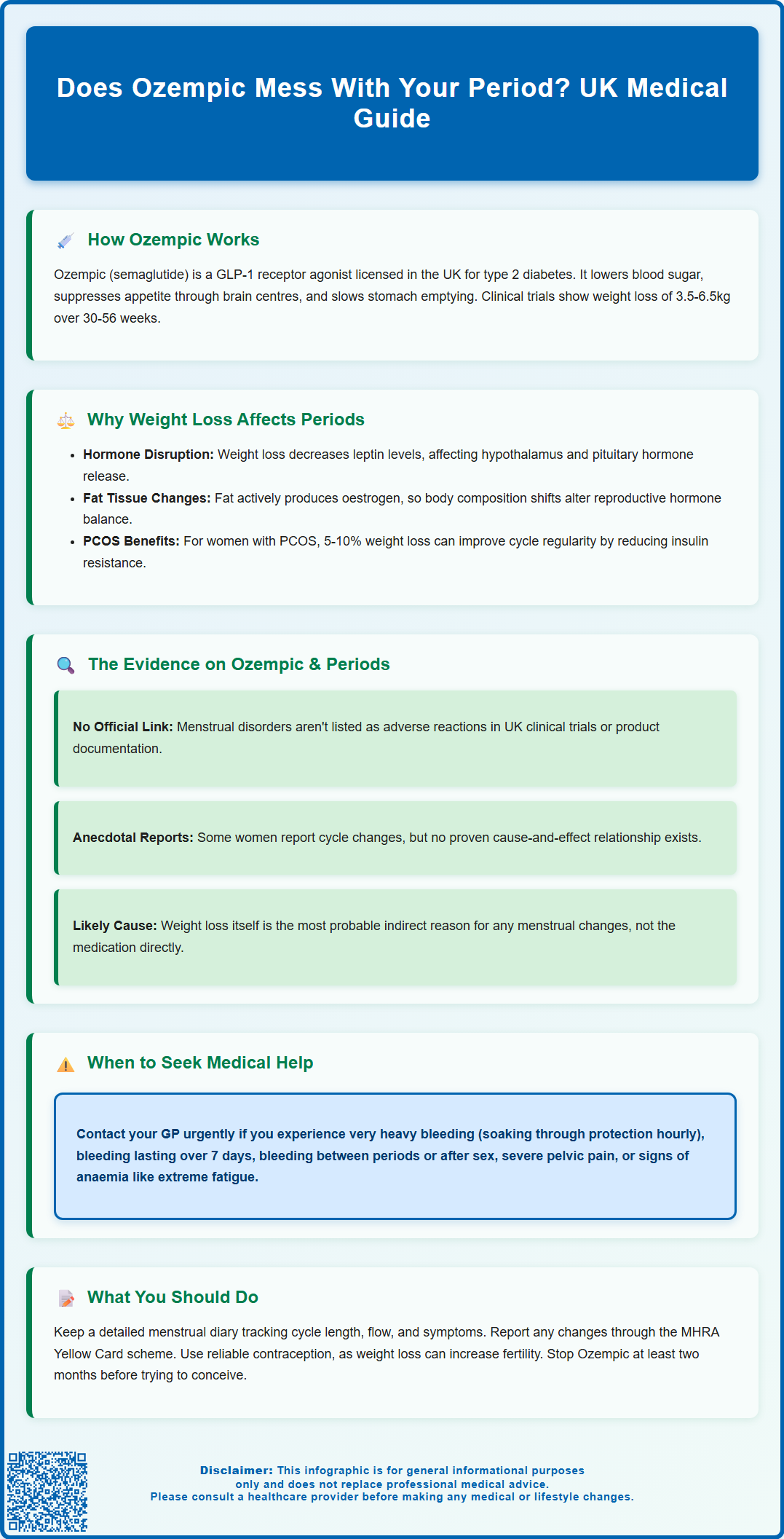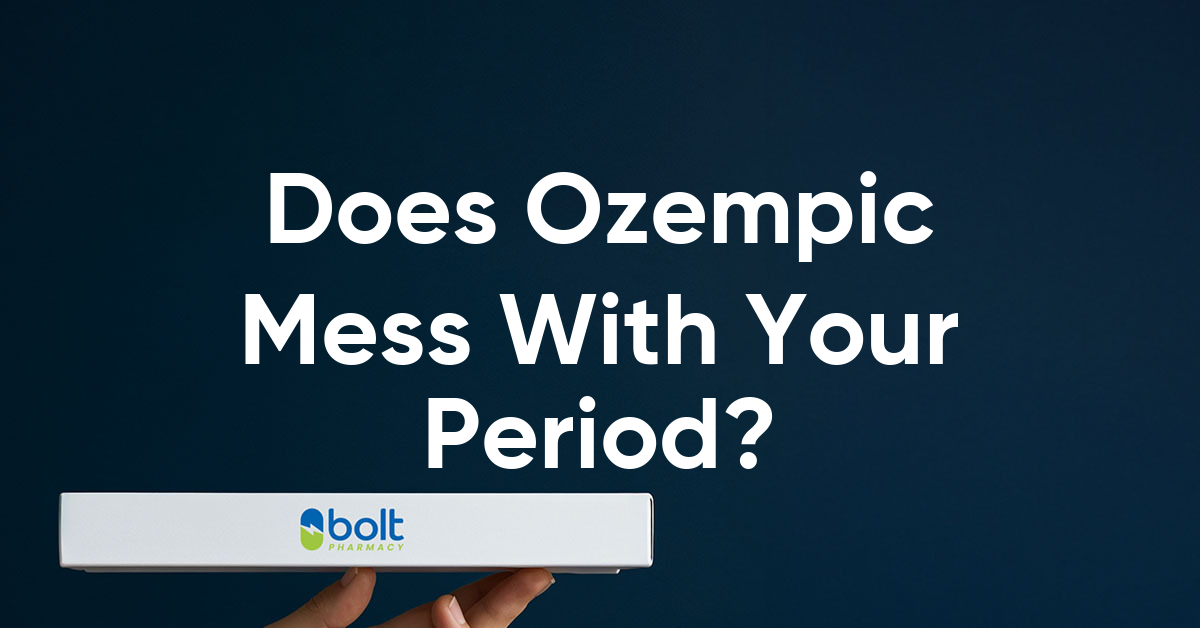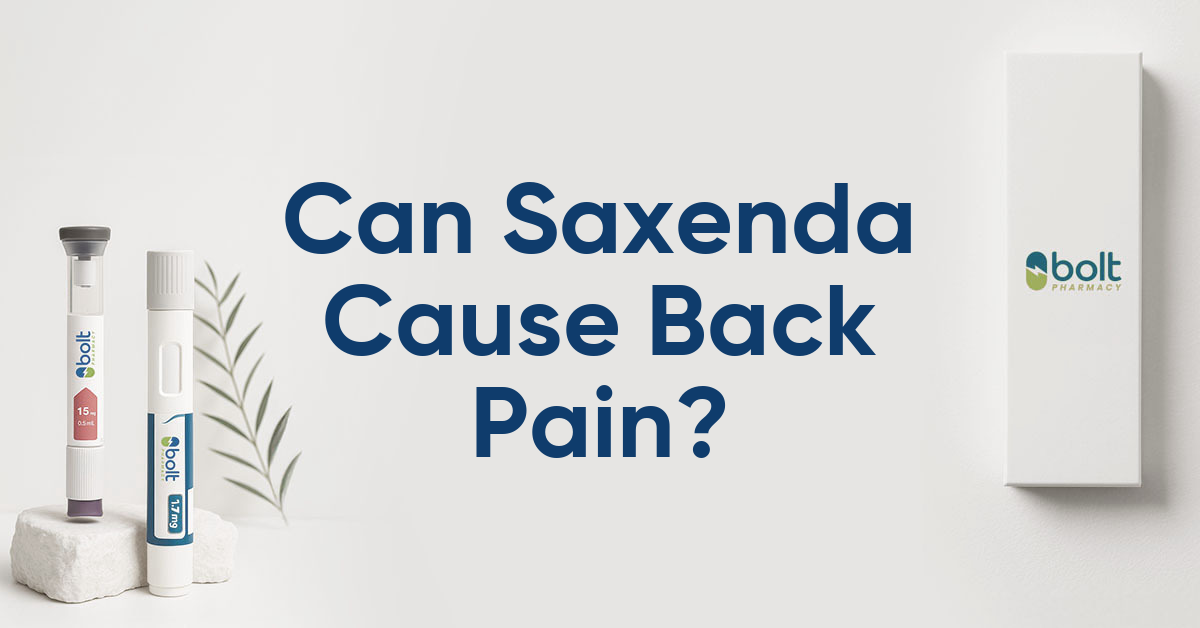Ozempic (semaglutide) is a GLP-1 receptor agonist licensed in the UK for type 2 diabetes management, though many patients wonder: does Ozempic mess with your period? While menstrual disturbances are not officially listed as adverse reactions in the medication's Summary of Product Characteristics, some women report cycle changes during treatment. These alterations may relate to weight loss and metabolic shifts rather than direct hormonal effects. Understanding the potential mechanisms and knowing when to seek medical advice can help you manage your health confidently whilst using this medication.
Summary: Ozempic is not officially linked to menstrual disturbances, but some women report cycle changes likely due to weight loss and metabolic improvements rather than direct hormonal effects.
- Ozempic (semaglutide) is a GLP-1 receptor agonist licensed in the UK for type 2 diabetes, working by stimulating insulin secretion and slowing gastric emptying.
- Menstrual disorders are not listed as adverse reactions in the UK Summary of Product Characteristics for Ozempic.
- Weight loss from Ozempic may indirectly affect periods by altering leptin levels and reproductive hormone balance through the hypothalamic-pituitary-ovarian axis.
- Women with PCOS may experience improved menstrual regularity with weight loss due to reduced insulin resistance and androgen production.
- Ozempic should be discontinued at least two months before planned pregnancy and is not expected to reduce oral contraceptive effectiveness according to FSRH guidance.
Table of Contents
How Ozempic Works and Its Effects on the Body
Ozempic (semaglutide) is a glucagon-like peptide-1 (GLP-1) receptor agonist licensed in the UK for the treatment of type 2 diabetes mellitus. The Medicines and Healthcare products Regulatory Agency (MHRA) has approved this medication primarily for glycaemic control, while a higher dose formulation (Wegovy) is specifically licensed for weight management. Semaglutide works by mimicking the action of the naturally occurring hormone GLP-1, which is released from the intestine in response to food intake.
The medication exerts its therapeutic effects through several mechanisms. It stimulates insulin secretion from pancreatic beta cells in a glucose-dependent manner, meaning insulin is only released when blood glucose levels are elevated. Simultaneously, it suppresses glucagon secretion, which reduces hepatic glucose production. Ozempic also slows gastric emptying, prolonging the time food remains in the stomach, which contributes to increased satiety and reduced appetite. These effects on the gastrointestinal system are mediated through GLP-1 receptors located throughout the gut.
Beyond its primary metabolic effects, Ozempic influences appetite regulation. The medication appears to affect central appetite pathways, with GLP-1 receptors found in brain regions responsible for appetite regulation, including the hypothalamus. This contributes to reduced food intake and modest weight loss in many patients with type 2 diabetes. In clinical trials for Ozempic (SUSTAIN programme), patients experienced weight reductions of approximately 3.5-6.5kg over 30-56 weeks, depending on the dose. The medication is administered once weekly via subcutaneous injection, with doses typically starting at 0.25mg and gradually increasing to maintenance doses of 0.5mg, 1mg, or 2mg depending on individual response and tolerability. Common adverse effects include nausea, vomiting, diarrhoea, and constipation, which are generally most pronounced during dose escalation.
Importantly, Ozempic is not recommended during pregnancy and should be discontinued at least two months before a planned pregnancy, according to the Summary of Product Characteristics.

Why Weight Loss Medications May Influence Periods
The relationship between body weight and menstrual function is well established in medical literature. The hypothalamic-pituitary-ovarian axis, which regulates the menstrual cycle, is highly sensitive to changes in body composition, nutritional status, and metabolic signals. Adipose tissue is not merely a storage depot but an active endocrine organ that produces hormones, including oestrogen through the aromatisation of androgens. When significant weight loss occurs, the balance of reproductive hormones can shift considerably.
Rapid or substantial weight reduction can disrupt normal menstrual patterns through several mechanisms. Decreased leptin levels, a hormone produced by fat cells that signals energy availability to the brain, may affect the pulsatile release of gonadotropin-releasing hormone (GnRH) from the hypothalamus. This can subsequently alter the secretion of luteinising hormone (LH) and follicle-stimulating hormone (FSH) from the pituitary gland, both essential for ovulation and regular menstrual cycles. Women who lose significant weight quickly may experience oligomenorrhoea (infrequent periods), amenorrhoea (absence of periods), or irregular cycle lengths. This is sometimes referred to as functional hypothalamic amenorrhoea, which can occur with rapid weight loss or significant energy deficits.
For women with polycystic ovary syndrome (PCOS), weight loss can paradoxically improve menstrual regularity. NICE Clinical Knowledge Summaries for PCOS recommend weight management as a first-line intervention for overweight women with PCOS, as even modest weight reduction of 5-10% can restore ovulation and regular cycles. This occurs because weight loss reduces insulin resistance and decreases androgen production, both of which contribute to menstrual dysfunction in PCOS. Therefore, medications that facilitate weight loss may have opposing effects on menstruation depending on the individual's baseline metabolic and hormonal status. The speed and magnitude of weight loss, pre-existing conditions, and individual hormonal sensitivity all contribute to whether menstrual changes occur.
Can Ozempic Affect Your Menstrual Cycle?
There is currently no official, established direct link between Ozempic and menstrual cycle disturbances in the product's Summary of Product Characteristics (SmPC) or in large-scale clinical trials. Menstrual disorders are not listed as adverse reactions in the UK SmPC for Ozempic. The medication is not known to directly interact with reproductive hormones or the hypothalamic-pituitary-ovarian axis through its primary mechanism of action as a GLP-1 receptor agonist. However, some patients have reported menstrual changes while taking semaglutide, though causality has not been definitively established.
The menstrual changes reported by some women include alterations in cycle length, heavier or lighter menstrual bleeding, spotting between periods, and changes in premenstrual symptoms. Some women report that previously regular cycles become irregular, whilst others with historically irregular periods note improvements in cycle predictability. It is important to recognise that these reports do not constitute clinical evidence of a direct drug effect, and there is no official link confirmed by regulatory authorities or published in peer-reviewed literature.
Several factors may explain these observations without invoking a direct hormonal effect of the medication. The weight loss associated with Ozempic treatment is the most plausible indirect mechanism, as discussed previously. Additionally, improvements in insulin sensitivity and metabolic health may influence reproductive hormone balance, particularly in women with underlying insulin resistance or PCOS. Stress, dietary changes, and alterations in exercise patterns that often accompany weight loss efforts may also contribute to menstrual variability. Furthermore, women starting Ozempic may be more attentive to bodily changes and thus more likely to notice menstrual variations that might otherwise go unremarked. Menstrual irregularity is relatively common in the general population, independent of medication use.
If you suspect Ozempic may be affecting your menstrual cycle, you can report this as a potential side effect through the MHRA Yellow Card scheme, which helps monitor the safety of medicines in the UK.
What to Do If Your Period Changes on Ozempic
If you notice changes to your menstrual cycle after starting Ozempic, it is important to monitor these changes and discuss them with your GP or prescribing clinician. Keep a menstrual diary documenting cycle length, duration of bleeding, flow heaviness, and any associated symptoms such as pain or mood changes. This information will help your healthcare provider assess whether the changes are clinically significant and require investigation.
Certain menstrual changes warrant prompt medical attention. According to NHS guidance, you should contact your GP urgently if you experience very heavy bleeding (causing flooding, passing large clots, or soaking through protection every hour for several consecutive hours), bleeding that lasts longer than seven days, persistent or heavy bleeding between periods, bleeding after sex, severe pelvic pain, or symptoms of anaemia such as extreme fatigue or dizziness. These symptoms may indicate conditions unrelated to Ozempic that require investigation. Additionally, if you have missed three consecutive periods and pregnancy has been excluded, this warrants medical review.
Your GP may recommend investigations depending on your symptoms and clinical history. These might include a pregnancy test, blood tests to check full blood count and ferritin levels (for heavy bleeding), thyroid function, and possibly reproductive hormones (though these have limited value if you're using hormonal contraception). Pelvic ultrasound scanning may be indicated to exclude structural causes of abnormal bleeding. NICE guidance (NG88) on heavy menstrual bleeding recommends investigation for women with persistent changes in bleeding pattern, particularly those over 45 years or with risk factors for endometrial pathology. Postmenopausal bleeding in women aged 55 and over requires an urgent two-week referral to exclude cancer, as per NICE guideline NG12.
If menstrual changes are mild and investigations are reassuring, your clinician may recommend continued monitoring whilst continuing Ozempic, as cycles often stabilise as weight loss plateaus. However, if menstrual disturbances are distressing or significantly impact quality of life, discussing alternative diabetes management strategies or adjusting the Ozempic dose may be appropriate. Never discontinue prescribed medication without consulting your healthcare provider, as abrupt cessation may affect glycaemic control.
Women of reproductive age should ensure they are using reliable contraception, as fertility may increase with weight loss and metabolic improvement. According to the Faculty of Sexual and Reproductive Healthcare (FSRH), Ozempic is not expected to reduce the effectiveness of oral contraceptives. If pregnancy is planned, Ozempic should be discontinued at least two months before attempting conception, as semaglutide is not recommended during pregnancy.
Scientific References
- Ozempic 0.5 mg solution for injection in pre-filled pen - Summary of Product Characteristics.
- Ozempic - European Public Assessment Report.
- Overweight and obesity management - NICE guideline NG246.
- Irregular periods.
- Semaglutide and Cardiovascular Outcomes in Patients with Type 2 Diabetes (SUSTAIN-6).
- GLP-1 agonists and contraception - Patient information leaflet.
Frequently Asked Questions
Can Ozempic directly cause menstrual irregularities?
Ozempic is not known to directly affect reproductive hormones or the menstrual cycle through its mechanism as a GLP-1 receptor agonist. Any menstrual changes are more likely related to weight loss and metabolic improvements rather than direct drug effects on the hypothalamic-pituitary-ovarian axis.
Should I stop taking Ozempic if my periods become irregular?
Never discontinue Ozempic without consulting your GP or prescribing clinician, as this may affect your blood glucose control. Keep a menstrual diary and discuss any concerning changes with your healthcare provider, who can assess whether investigation or treatment adjustment is needed.
When should I seek urgent medical attention for period changes on Ozempic?
Contact your GP urgently if you experience very heavy bleeding (soaking through protection hourly), bleeding lasting over seven days, persistent bleeding between periods, bleeding after sex, severe pelvic pain, or symptoms of anaemia such as extreme fatigue. These may indicate conditions requiring investigation unrelated to Ozempic.
The health-related content published on this site is based on credible scientific sources and is periodically reviewed to ensure accuracy and relevance. Although we aim to reflect the most current medical knowledge, the material is meant for general education and awareness only.
The information on this site is not a substitute for professional medical advice. For any health concerns, please speak with a qualified medical professional. By using this information, you acknowledge responsibility for any decisions made and understand we are not liable for any consequences that may result.
Heading 1
Heading 2
Heading 3
Heading 4
Heading 5
Heading 6
Lorem ipsum dolor sit amet, consectetur adipiscing elit, sed do eiusmod tempor incididunt ut labore et dolore magna aliqua. Ut enim ad minim veniam, quis nostrud exercitation ullamco laboris nisi ut aliquip ex ea commodo consequat. Duis aute irure dolor in reprehenderit in voluptate velit esse cillum dolore eu fugiat nulla pariatur.
Block quote
Ordered list
- Item 1
- Item 2
- Item 3
Unordered list
- Item A
- Item B
- Item C
Bold text
Emphasis
Superscript
Subscript












